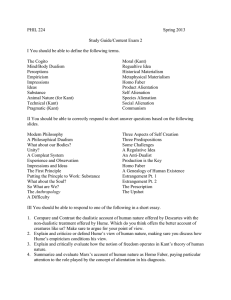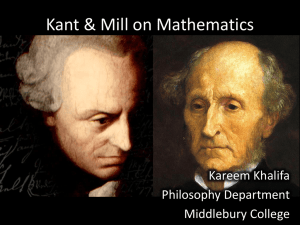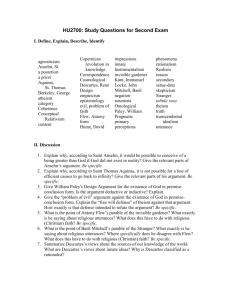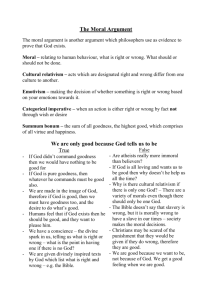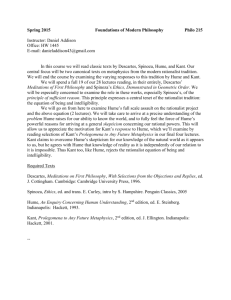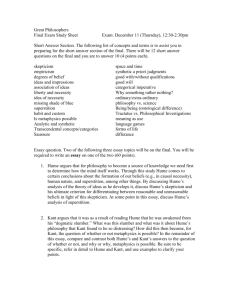kant
advertisement
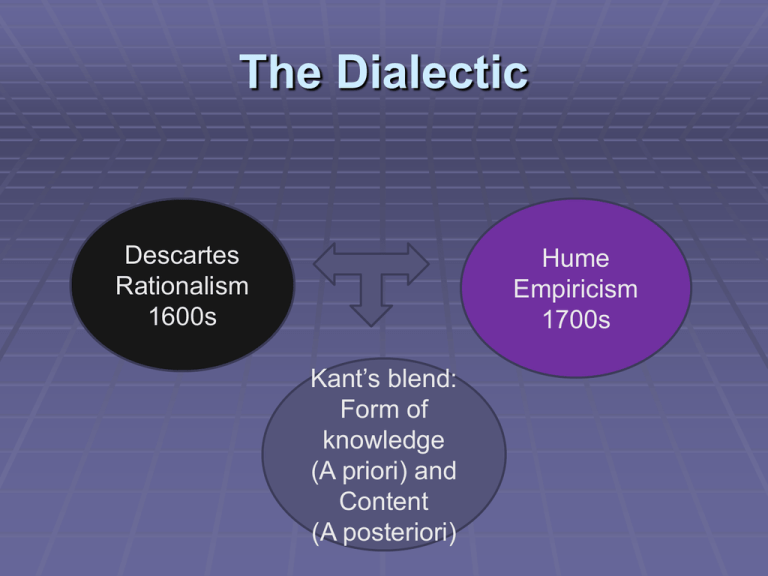
The Dialectic Descartes Rationalism 1600s Hume Empiricism 1700s Kant’s blend: Form of knowledge (A priori) and Content (A posteriori) Hegel’s Dialectic: Mechanism for Progress Becomes an everlasting and continuous building on ideas The strongest and most correct ideas survive through the dialectic process The most rational and reasonable thinking survives as history Immanuel Kant One smart Scottish-German Dude Got Your Shades On? Immanuel Kant (1724-1804) Son of Scottish Good will hunting… immigrant to Prussia A timely prof. Critique of Pure Reason (1781) a reply to Hume In Perpetual Peace proposed a League of Nations Epistemology: Empiricism and rationalism are both partly right Hume Descartes And both are incomplete… The Material of Knowledge and the Form of Knowledge We derive information through the human senses (material), but that information is seen through a priori intuitions or preconditions in the human mind (form) The mind is not just passive, receiving impressions…. a priori modes filter all empirical info Like wearing glasses…info is shaped via lenses We have a “pure”( non-empirical) intuition of: 1. time and space For us to experience Hume’s succession of experiences, a temporal-spatial framework must pre-exist Attributes of Pure Reason We also have preconditions or attributes of pure reason: 1. relation: the universe is a system of relationships, connections the law of causality 2. quantity 3. quality 4. actuality, possibility and necessity (modality) This epistemology means that we assume that outside of us, there is a thing in itself, but all we know is our experience of the thing to us. Huh? The Two Forms of Knowledge Deutch ist gut fur dich! Noumenon – Das Ding an sich. Intuitively known Phenomenon – Das Ding an ich. Material of knowledge comes through our senses Shaped by conditions in the human mind: attributes of pure reason and intuition Immanuel Kant One smart Scottish-German Dude Got Your Shades On? Morality: Pursuit of the Good Will Man has an inborn pursuit of moral law An a priori attribute of reason, like the law of causality or time and space There are 3 possible motives for any given action: 1. Self interest – being honest makes me likeable and admired. 2. Inclination – be honest out of fear, avoidance 3. Duty – be honest because it’s right this is best motive: alignment with categorical imperative But why Will and not Reason or Empathy? “It is impossible to conceive of anything at all in the world, or out of it, which can be taken as good without qualification, except a good will.” - Kant If one wills to be good, the good is in the willing (not the rationalizing). Reason helps us form our good will, but reason by itself does not make us happy Neither knowing nor feeling good is enough Deontological versus Consequential Ethics Consequences: utilitarian choices Deontological: adhering to rights or duties Who gets the 6 seats in a lifeboat that can only hold 9 people? Kant’s Categorical Imperative “I ought never to act in such a way except that I would will my choice to become a universal law that would apply to all others in my circumstance.” Get in a Group: Formulate a Maxim… 1. “Act as if the maxim of your action were to become through your will a Universal Law of Nature.” 2. Generalize it: Don’t make an exception of yourself! 3. Test for conceptual and volitional consistency. 4. Does it hold up? Freedom comes from being able to obey the moral law within 1. We are only free when we obey the law of the categorical imperative. 2. We are free when we can will ourselves to live by its dictates. 3. Many people are bound by their sensory appetites or rationalizing reason. They choose to live by their desires and excuses 4. Their will is ineffective 5. Therefore, they are not free Hence, Kant’s ethical system is called a duty ethics or good will ethics When we attempt to understand answers to ultimate questions we get stuck. Why? Neither our senses nor our reason are enough. Reason gets stuck between plausible reasoned answers because there is insufficient empirical evidence to fully process the answer. The ultimate question: Does God exist? Descartes said the fact we, as imperfect beings, have the concept of an infinite perfect being means God must exist. Hume said we can’t perceive God, so we don’t know…(but God’s likely a false complex idea) What does Kant say? God Kant Be? Says Who? Ultimately, Intuition is the only true basis we have for knowing God’s existence Non-empirical Non-rational God as Practical Postulate Reason may not convince you and that’s not surprising since God is too big to “prove.” But, practically speaking… 1. We must postulate God in order to rationally practice morality. 2. If goodness and happiness (the summon bonum) can’t be achieved here by all, that is unjust. 3. God must exist in order to aid justice and the pursuit of morality: not the other way around! 4. Also, our concept of perfect goodness requires a perfectly good will. That good will is God. Immortality as Reasonable Postulate Assumption: Summum Bonum is a state of complete virtue and happiness 1. We can’t conceive of virtue without a good will behind it… 2. A good will is necessary 3. The consummation of a good will is a good will for all. 4. A virtuous person (good will) is not often able to achieve happiness; 5. While it is correct to pursue goodness, happiness is not always a clear by-product. 6. Dictates of reason require immortality to reach summum bonum: complete goodness and happiness for all.
